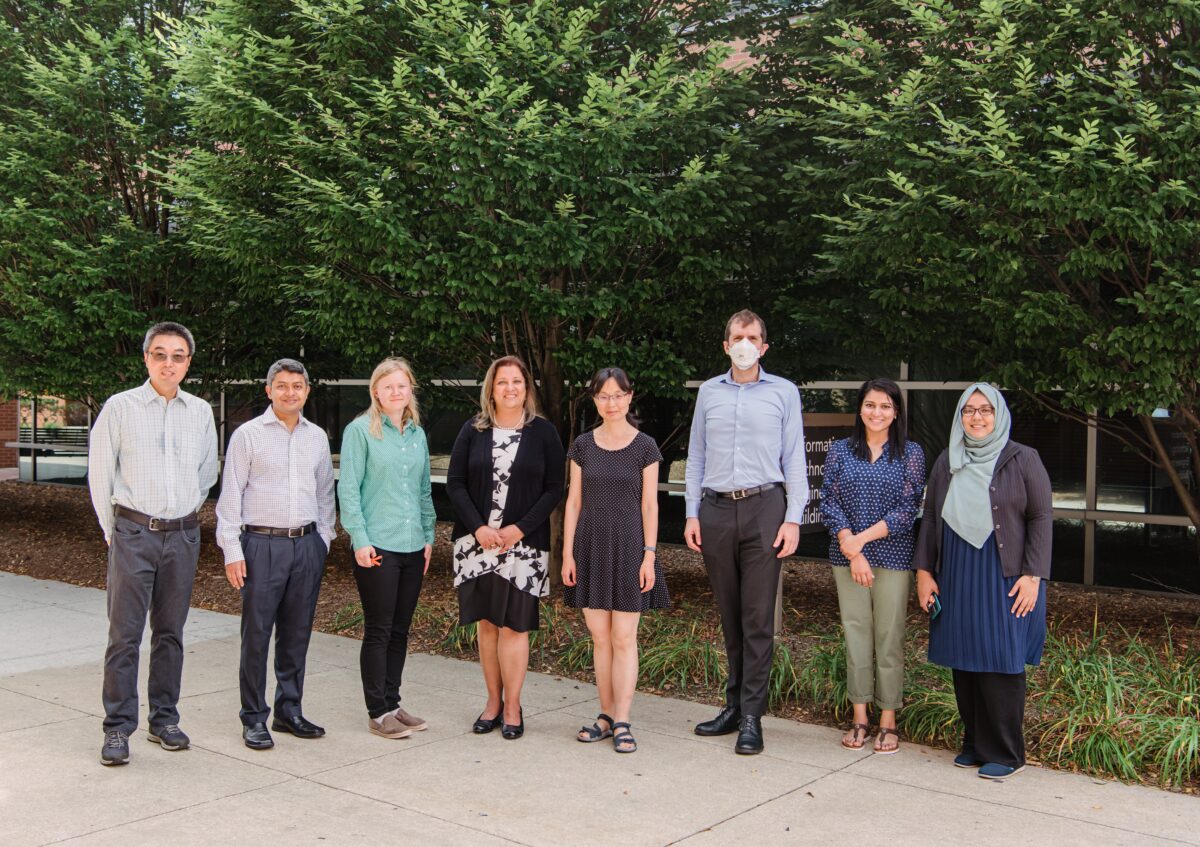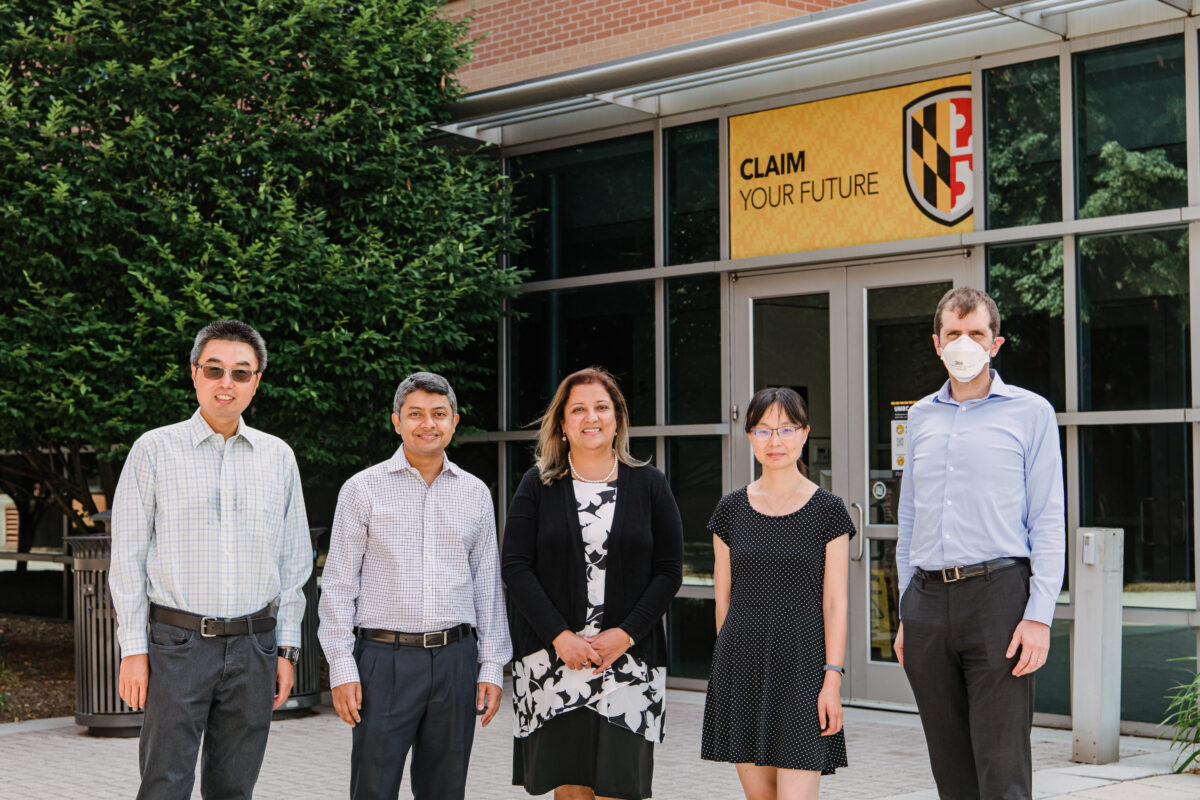
Tens of millions of people live in areas that are at risk for flooding due to climate change, sea level rise, and melting of glaciers. UMBC’s Vandana Janeja is leading a team of researchers using data science, machine learning, artificial intelligence (AI), and polar science to analyze enormous volumes of climate data, and Arctic and Antarctic observations in ways that could help populations prepare for and respond to these risks.
Janeja, professor and chair of information systems, is the principal investigator on the five-year, $13 million grant from the National Science Foundation’s Harnessing the Data Revolution (HDR) Big Idea program. With support from the grant, Janeja is directing iHARP, the NSF HDR Institute for Harnessing Data and Model Revolution in the Polar Regions.
 Vandana Janeja. (Marlayna Demond ’11/UMBC)
Vandana Janeja. (Marlayna Demond ’11/UMBC)
“The research we’re doing in iHARP will help us understand global drivers of sea level rise and its impacts. This work will look at complex dynamics in the polar regions, evaluating heterogeneous data and connections between climate processes. This will help us get to more certain assessments, to drive the science responding to climate change,” she explains.
Data science meets climate science
Climate scientists rely on data that are incredibly challenging to disentangle. AI offers solutions for analyzing these large datasets, providing sophisticated models that make the best use of the available data.
“Researchers in iHARP are already looking at ice sheets in the Arctic and the Antarctic, including labeling of ice layer images. They are examining anomalous trends in ice thickness and creating new algorithms for understanding which factors are causing which types of changes in such a dynamic environment,” explains Janeja.
The iHARP researchers will reduce uncertainties in projecting sea level rise by combining physics-driven modeling, machine learning techniques, and data analysis. The results of the work will inform policymaking to address national and global priorities related to the climate crisis.
The team will also investigate novel data science techniques that can be applied to other disciplines encountering challenges related to complex data.
Tackling challenges together
An interdisciplinary team has been assembled to move forward this important collaboration. Janeja is working with co-PIs Jianwu Wang, associate professor of information systems at UMBC; Mathieu Morlighem at Dartmouth College; Shashi Shekhar at the University of Minnesota; and researchers from the University of Colorado Boulder.
 Jianwu Wang. (Maryland Demond ’11/UMBC)
Jianwu Wang. (Maryland Demond ’11/UMBC)
Project collaborators in education, government, and industry across the country include additional researchers and collaborators at the above universities as well as University of Alaska Fairbanks, University of Northern Texas, Amherst College, University of Texas at Austin, NASA Universities Space Research Association, NASA Jet Propulsion Laboratory, NVIDIA, IBM, and Amazon.
The grant also involves dozens of undergraduate and graduate students and postdoctoral researchers, and will support educational and outreach activities, with an eye toward workforce development. This includes programming for K-12 and college students, and lectures and training opportunities for data science and domain science professionals. Students will work alongside partners including NASA, Amazon, and IBM, and will have internship opportunities with federal and industry partners.
 UMBC iHARP faculty and student researchers. (Maryland Demond ’11/UMBC)
UMBC iHARP faculty and student researchers. (Maryland Demond ’11/UMBC)
“This major multi-institutional NSF award reflects so much hard work and ingenuity. National programs like iHARP, with its focus on some of the great challenges our society is facing, add to UMBC’s growing reputation for innovation and excellence in public impact research,” says Karl V. Steiner, vice president for research at UMBC.
Impact of multidisciplinary teams
The solutions that are developed through this work will have applications beyond environmental issues. The team’s research may impact the future of medicine, computer vision, responsible AI , and remote sensing. And students working on the project will become the next generation of experts addressing these global issues.
“The College is experiencing extraordinary research growth. This is made possible by both the development of multidisciplinary teams and our increased focus on leadership development,” says Keith J Bowman, dean of the College of Engineering and Information Technology. “This project team, and others recently funded or pending, benefit from the tremendous faculty talent we have recruited in the last several years.”
 UMBC iHARP researchers (l-r): Jianwu Wang, Osman Gani, Vandana Janeja, Karen Chen, and Don Engel. (Marlayna Demond ’11/UMBC)
UMBC iHARP researchers (l-r): Jianwu Wang, Osman Gani, Vandana Janeja, Karen Chen, and Don Engel. (Marlayna Demond ’11/UMBC)
In addition to Janeja and Wang, the UMBC team also includes Aryya Gangopadhyay, professor; Karen Chen, assistant professor; and Osman Gani, assistant professor, all in information systems, as well as Don Engel, associate vice president for research development and assistant professor of computer science and electrical engineering.
Editor’s note: This story is an update of a prior version published on September 28, 2021.





